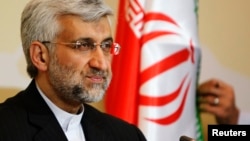The European Union's foreign policy chief says nuclear talks between Iran and six world powers have ended without an agreement.
Catherine Ashton said Saturday the two sides "remain far apart on substance," after a second and final day of negotiations in Kazakhstan.
Russian Deputy Foreign Minister Sergei Ryabkov said there was no agreement on a date or venue for further talks.
Iran's chief nuclear negotiator, Saeed Jalili, acknowledged differences between the two sides. He reiterated Iran's position that it has a right to enrich uranium, and said Tehran is hoping for more concessions from world powers before curtailing its uranium enrichment production.
2012
January: IAEA confirms Iran is refining uranium to 20% fissile purity
February: UN inspectors end talks in Tehran without inspecting disputed military site at Parchin
April: Iranian President Mahmoud Ahmadinejad vows Iran will not surrender its nuclear rights
May: UN inspectors report finding traces of significantly upgraded uranium at an Iranian site
July: EU begins total ban on Iranian oil imports; US expands sanctions
September: IAEA demands access to Parchin; Iran calls EU sanctions "irresponsible"
December: IAEA says it made progress in talks with Iran; US imposes more sanctions.
2013
January: Iran says it will speed up nuclear fuel work
February: Iran's supreme leader Ayatollah Ali Khamenei rejects direct nuclear talks with the U.S.; Iran, world powers meet, agree to more talks.
May: IAEA says Iran has expanded nuclear activity.
September: Iranian President Hassan Rouhani says Iran will not seek weapons of mass destruction. Iran and world powers agree to resume nuclear talks.
October: Iran set to begin talks with five permanent members of U.N. Security Council and Germany
During two days of meetings in Almaty, Kazakhstan, the major powers had hoped to reach a compromise with Iran to resolve their concerns about the widespread belief that Iran's nuclear program conceals a covert effort to make nuclear bombs.
Delegates from the U.S., Britain, France, Russia, China and Germany met with Iranian officials on proposals that would have allowed some exceptions to the international sanctions program against Iran, if authorities there would close a controversial nuclear facility and turn over the national stockpile of enriched uranium.
A spokesman for Ashton urged Iran earlier to take a "confidence-building step" and reassure the international community it is not engaged in a nuclear weapons program for military purposes.
Iran has long maintained that its nuclear program has only peaceful purposes, including power generation.
The United States attended the talks with the four other permanent members of the U.N. Security Council - Britain, France, Russia and China. German representatives were also there.
Catherine Ashton said Saturday the two sides "remain far apart on substance," after a second and final day of negotiations in Kazakhstan.
Russian Deputy Foreign Minister Sergei Ryabkov said there was no agreement on a date or venue for further talks.
Iran's chief nuclear negotiator, Saeed Jalili, acknowledged differences between the two sides. He reiterated Iran's position that it has a right to enrich uranium, and said Tehran is hoping for more concessions from world powers before curtailing its uranium enrichment production.
Iran's Nuclear Program
Iran's Nuclear Program2012
January: IAEA confirms Iran is refining uranium to 20% fissile purity
February: UN inspectors end talks in Tehran without inspecting disputed military site at Parchin
April: Iranian President Mahmoud Ahmadinejad vows Iran will not surrender its nuclear rights
May: UN inspectors report finding traces of significantly upgraded uranium at an Iranian site
July: EU begins total ban on Iranian oil imports; US expands sanctions
September: IAEA demands access to Parchin; Iran calls EU sanctions "irresponsible"
December: IAEA says it made progress in talks with Iran; US imposes more sanctions.
2013
January: Iran says it will speed up nuclear fuel work
February: Iran's supreme leader Ayatollah Ali Khamenei rejects direct nuclear talks with the U.S.; Iran, world powers meet, agree to more talks.
May: IAEA says Iran has expanded nuclear activity.
September: Iranian President Hassan Rouhani says Iran will not seek weapons of mass destruction. Iran and world powers agree to resume nuclear talks.
October: Iran set to begin talks with five permanent members of U.N. Security Council and Germany
Delegates from the U.S., Britain, France, Russia, China and Germany met with Iranian officials on proposals that would have allowed some exceptions to the international sanctions program against Iran, if authorities there would close a controversial nuclear facility and turn over the national stockpile of enriched uranium.
A spokesman for Ashton urged Iran earlier to take a "confidence-building step" and reassure the international community it is not engaged in a nuclear weapons program for military purposes.
Iran has long maintained that its nuclear program has only peaceful purposes, including power generation.
The United States attended the talks with the four other permanent members of the U.N. Security Council - Britain, France, Russia and China. German representatives were also there.





